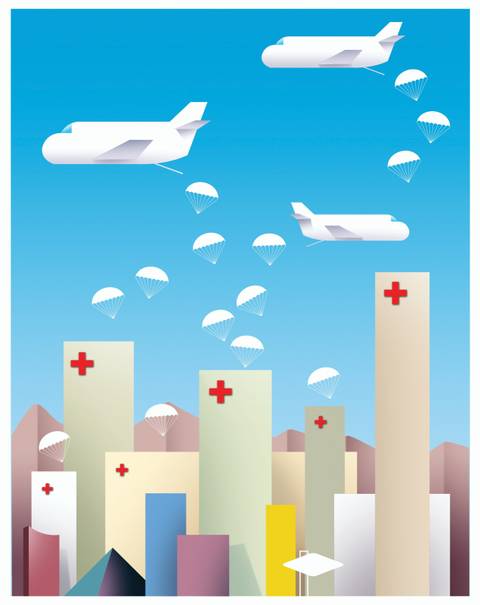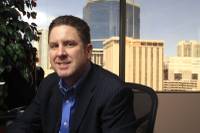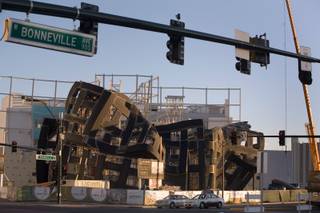VEGAS INC archives
You might say Gary Kuntz is a regular at Planet Hollywood.
Lots of people at the Strip resort know him. The doormen. The bell staffers. The bartenders.
Kuntz says his casino host, Glenn Berk, is the best. He tends to Kuntz’s every need when he’s in town.
“Those people are incredible,” Kuntz said of the Planet Hollywood crew. “I would rate them as one of the best in Las Vegas. They have bent over backward to help me.”
Yet Kuntz, a CPA in private practice in Bozeman, Mont., isn’t a high-roller. In fact, the main reason he comes to Las Vegas is to be treated for prostate cancer.
In his last trip to Las Vegas in late March, he flew from Bozeman and his first stop was to see his doctors at Comprehensive Cancer Centers of Nevada.
Kuntz is undergoing Provenge vaccine therapy to treat his cancer. After his initial stop to see doctors on a Tuesday, he spent a couple of days sightseeing and playing slot machines at the casino. He returned to the doctor for the second part of his procedure on Friday, then boarded a flight back to Bozeman the next day.
By Sunday afternoon, he was back to work preparing tax returns during the busiest time on a CPA’s calendar.
He’ll be back to do it again later this month, making four trips to Las Vegas since the beginning of the year.
On each trip, the visits to the doctor are the critical business, but there’s also time allocated for having fun.
Kuntz personifies the concept of medical tourism — serving a patient who travels away from home for medical treatment and who mixes leisure activities with doctor visits.
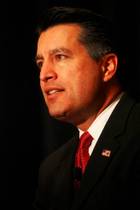
Gov. Brian Sandoval
Medical tourism has been on Southern Nevada’s radar for more than a decade, but only recently have the medical community and the tourism industry coordinated efforts well enough to begin turning the concept into reality and make medical tourism into a bona fide piece of Gov. Brian Sandoval’s economic diversification package.
For years, medical tourism in Southern Nevada languished. It had the “tourism” part of the equation down, but the “medical” part was lacking. Everybody’s heard the old joke: Where is the best place to go for medical treatment in Southern Nevada? McCarran International Airport.
But now, through a series of initiatives by several parties, McCarran is the gateway for people coming to Las Vegas for medical care.
• • •
By most accounts, Las Vegas can’t truly consider itself a hub for medical tourism just yet, but progress made in the last year indicates it’s on its way.
Doug Geinzer, CEO of the Southern Nevada Medical Industry Coalition, is the closest to being considered the point person for medical tourism in Las Vegas. He first got a whiff of what medical tourism could mean for Southern Nevada in 2001 when he was a volunteer with the coalition and supported the organization’s efforts to address a shortage of nurses.
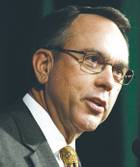
James B. Gibson
Geinzer worked in the trenches as community leaders sought a legislative solution to the nursing shortage. Among the leaders involved were former Henderson Mayor Jim Gibson; Ann Lynch, vice president of government relations at Sunrise Hospital; Charles Perry, president and CEO of the Nevada Health Care Association, and Bob Cooper, Henderson’s Economic Development Division manager.
During the debate about how to address the shortage, the leaders first began discussing medical tourism concepts. One of the concept’s biggest boosters was former Lt. Gov. Lorraine Hunt, who chaired the Nevada Tourism Commission.
But Geinzer said when the Las Vegas economy was booming in the early 2000s, no one paid too much attention to building medical tourism. Cash registers were already ringing, thanks to leisure travelers and conventioneers. Once the recession hit, medical tourism conversations were revived and Sandoval listed it as one of seven economic development clusters needed to diversify Southern Nevada’s economy.
Meanwhile, things were happening in the medical community.
Then-Las Vegas Mayor Oscar Goodman, who also chaired the Las Vegas Convention and Visitors Authority, pressed the city to offer some of its 61 acres near downtown Las Vegas to draw world-class medical facilities.
Ground was broken in 2007 for the Lou Ruvo Center for Brain Health, and the facility opened in 2009 with the highly regarded Cleveland Clinic running it.
While some of the best specialists in their fields had been in Southern Nevada for years, the Lou Ruvo Center and the Cleveland Clinic provided a catalyst for people to understand that medical excellence was available in Las Vegas.
The national Medical Tourism Association, based in Florida, took note and worked with the LVCVA to develop a destination guide listing the region’s top medical facilities as well as resort destinations and entertainment.
Geinzer and Chris Meyer, vice president of sales for the LVCVA, organized the first-ever medical tourism symposium in late January to bring together representatives of the medical and tourism establishments with community leaders to discuss the next steps in developing a plan. While several in attendance pointed out shortcomings in medical care in Southern Nevada, Geinzer was enthusiastic because the LVCVA was on board with developing a strategy.
“Once the LVCVA said ‘We’re in,’ all of the sudden it became real,” Geinzer said.
How real is it for the LVCVA? The agency that markets Las Vegas to the world has hired a full-time staff member dedicated exclusively to medical tourism development. Cheryl Smith started work April 2 as medical tourism sales manager.
In that role, Smith will market and promote Las Vegas as a premier medical tourism destination through trade events in a wide range of business sectors, which include health-care related industries, wholesale and consortia, industry trade associations, travel agent and travel trade organizations and client development events.
But as community leaders at the symposium pointed out, the “tourism” aspect of medical tourism isn’t at issue. It’s the “medical” side that needs work.
Geinzer said the biggest problem the local medical establishment faces is getting its good news out to the public when scandals and improprieties make headlines.
Some practices are recognizing that they need to market their successes. One of them is the Comprehensive Cancer Centers of Nevada — the center managing Gary Kuntz’s care — which is affiliated with UCLA and US Oncology.
“We haven’t put our flag out there and shown the world who we really are,” said James Kilber, executive director of the center. “It’s our time to do that.”
The center has recruited some of the top physicians in the world, and they have access to 220 clinical trials. Clinical trials give physicians access to a database of approved medical treatments with successful outcomes so that a procedure that worked for a patient can be used for a new patient with similar symptoms.
Thanks to its 15-year relationship with UCLA, the center has immediate access to the results of drugs that are new to the market.
Kilber said the center began telling its story this month with a new marketing and advertising program. Some of those ads star Kuntz, who agreed to appear in them because he was so happy with the treatment he received and his outlook.
Part of the campaign involves erasing some of the misconceptions the public has about cancer and its treatment.
“I think the mental picture that most people have in their minds is that if a person has cancer, they’re lying in bed, they have hair missing, they’re vomiting constantly … we don’t see that,” said Dr. James Sanchez, a specialist in lymphoma and lung cancer who has been with the center for 20 years. “There are a few here and there, but the vast majority don’t experience that.”
Sanchez and Kilber advocate promoting Las Vegas as a center for medical tourism because of the amenities the city has for people who visit. They agree that there’s plenty of quality care offered in Southern Nevada and that it doesn’t make sense for patients to travel for treatment if they can get it here.
“If Las Vegas ever is going to come into the 21st century and be a metropolitan area like any other city, we need to grow up and realize that quality care does exist,” Sanchez said. “It’s all perception. And the reality is, how many people can afford that (to travel for treatment)? How many Joe Blows, working at a casino, waiting tables, can afford to travel to UCLA, spend several nights every three weeks at a hotel, drive back and forth and on the way, they’re getting sick? It doesn’t make any sense.”
Sanchez applauds the arrival of high-profile medical centers to Las Vegas because their presence raises the bar for groups that are here.
“In order for us to do or compete with places like the Cleveland Clinic, we have to be on par with them,” he said. “That’s our goal. We’re not going to take short cuts. We’re going after the right pieces, the right people, the right integration to do it right.”
Professional jealousies are just one of the many divides that keep the medical community from unifying to move medical tourism ahead, Geinzer said.
Among those divided: MDs vs. DOs; academia vs. practitioner; Muslim vs. Christian; for profit vs. not for profit; generalist vs. specialist; Democrat vs. Republican. Jim Rogers, the former university system chancellor, added one more when he addressed January’s medical tourism symposium: Northern Nevada vs. Southern Nevada.
Turf wars and egos have prevented the state university system from developing a cohesive plan for the state’s medical school. Part of the problem is the state’s medical school is at the University of Nevada in Reno while most of the population, resources and tourism amenities are in Southern Nevada — and administrators from north and south don’t talk with each other, Rogers said.
Meanwhile, successful med school programs are flourishing in Utah and Arizona, he said.
Offering good news from the practitioners alone won’t turn the tide, and Geinzer understands that. To provide objectivity, the coalition has hired third-party evaluators to measure patient outcomes, physician return rates, medical malpractice incidents and board certifications and licensures. Those measures will be stacked up against national standards and compared with physicians from across the country.
“We may have some doctors who are the best in the valley, but is his practice really a center of excellence? How does he compare with someone in, say, San Francisco?” Geinzer said. “If we don’t do this, we could become guilty of marketing people who aren’t the best of the best. We can’t do that. We can’t tarnish the Vegas brand.”
Although Geinzer’s coalition and the LVCVA have only been at developing a strategic plan for a couple of months, he said the third-party evaluation is nearly complete. And in that short time, several centers of medical excellence have been identified in Southern Nevada — treatments, procedures and practitioners able to attract medical tourists not only domestically but internationally.
“Are we going to be the organ transplant capital of the world? Not in my lifetime,” Geinzer said. “But Southern Nevada does have some of the best in their fields.”
On Geinzer’s list of best in the business are specialists in bariatrics, orthopedics, plastic surgery, fertility and dental implants.

Dr. James Atkinson, Daswell's surgeon, talks about the bariatric procedures he and a partner perform on about 100 patients a month.
Geinzer applauded the work of Dr. James Atkinson and his Surgical Weight Control Center in advancing gastric band and gastric sleeve surgical procedures. Geinzer said insurance companies were paying more and more attention to such procedures as a means of addressing Type 2 diabetes, one of the most expensive diseases to treat.
“We’ve got all these casino buffets in town. Imagine that Las Vegas, because of these centers for excellence, could down the road be recognized as the city that did the thinning of America,” Geinzer said.
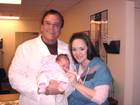
Dr. Geoffrey Sher
Dr. Geoffrey Sher founded the Sher Institute for Reproductive Medicine, Las Vegas Fertility Clinic and has provided treatments that have resulted in more than 18,000 babies for couples who never expected to have a chance to conceive a child.
One of the first conduits for medical tourism in Southern Nevada is more about wellness than sickness — massage therapy in the city’s world-renowned spas.
“I haven’t quantified it yet, but I’m sure Las Vegas has introduced more people to massages than any other city because there are people who travel here just to use our spas,” Geinzer said.
Some spas are training their masseurs and masseuses to refer customers to orthopedic specialists, and Geinzer said he wouldn’t be surprised if some resorts hire an orthopedic specialist so that clients can be treated without leaving the property.
George Eversaul, who developed AquaStretch therapy to help athletes maintain peak performance, has trained many of the spa professionals at Bellagio. Geinzer said Eversaul’s vision is to have therapists trained up and down the Strip.
Geinzer envisioned other possibilities in medical tourism, especially with some collaboration with the LVCVA.
Hundreds of companies offer physicals for their executives. Many of those executives attend conferences, conventions and trade shows in Las Vegas. Why not set up a clinic at the Las Vegas Convention Center to perform executive physicals while they’re in town on business?
Geinzer suggested a clinic could even do quick checks for skin cancer screening.
While the high-profile clinics have attracted other physicians to establish a presence in Southern Nevada, Geinzer acknowledges that Las Vegas won’t be home to every specialty and that McCarran will continue to be where some people go to pursue treatment options. Geinzer, in fact, is one of them.
He travels to Florida for medical treatment, leaving $4,000 to $6,000 to that state’s economy when he goes. Medical tourists leave similar amounts when they travel to Nevada.
The Medical Tourism Association recommends that patients budget $2,400 for a week’s stay for their medical travel in addition to the cost of the procedure.
Of course, in Las Vegas — if you’re lucky — you could leave with more than you came with.
Kuntz flies nonstop to Las Vegas from Bozeman on Las Vegas-based Allegiant Air, which specializes in travel between small towns and resort cities. Because he’s a loyal customer of Planet Hollywood, he gets some comps.
And on two occasions, Kuntz said he got lucky at the slots, winning jackpots of $5,000 and $6,000 playing two quarters.
That’s the kind of publicity that could really make medical tourism soar in Las Vegas.
